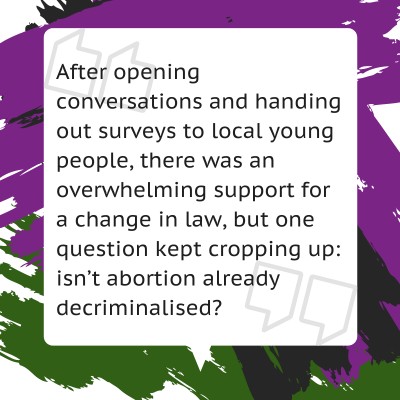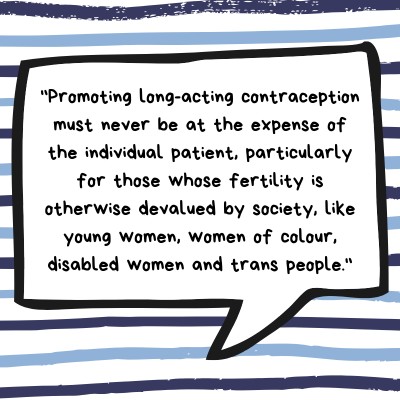Engender blog
F-words: the language of abortion
Dr Carrie Purcell is a Research Fellow in the Complexity in Health Improvement Programme, at the MRC/CSO Social and Public Health Sciences Unit at the University of Glasgow. Carrie also leads the Sexuality and Abortion Stigma Study (SASS).
Head to Twitter to follow Carrie and the SASS project.
As a sociologist, and a researcher who works on abortion, I spend a lot of time thinking about the language that’s used around abortion in everyday, medical, academic, media and advocacy contexts. This blog presents some of my reflections on that language.
GUEST POST: Decriminalisation of Abortion for a Modern Scotland

Following the passing of a motion in support of decriminalisation of abortion during the Scottish Youth Parliament's virtual motion debates this spring, MYSP's Emily Harle and Erin Campbell have written for us on why access to abortion is an important issue for Scotland's young people.
Emily Harle (she/her) is a Trustee and member of the Scottish Youth Parliament (MSYP) for Glasgow Kelvin, and Erin Campbell (they/them) is an MSYP for Midlothian North and Musselburgh, and the Deputy Convenor of SYP’s Equalities and Human Rights Committee. The Scottish Youth Parliament is the democratically elected voice of Scotland’s young people, aged 12-25. You can read more about SYP here, and follow them on Twitter @OfficialSYP. You can also follow Emily @EmilyMSYP, and Erin @syperincampbell.
In 1861, the Offences Against the Persons Act passed and abortion became a criminal offence in the UK, with women facing a penalty of life imprisonment for terminating a pregnancy. This outdated law was never overturned. The 1967 Abortion Act, which is commonly said to have legalised abortion, did not fully decriminalise it. Instead, the law provided an extremely strict set of criteria under which the procedure would be permissible, including a requirement for two written doctor’s signatures to confirm that continuing the pregnancy would severely damage either the mother or child.
Abortion, rights, and representation
Attempts to erode women's reproductive rights have been seen this week in England and at Holyrood; here Engender's Policy Manager, Jill Wood, sets out why we must challenge misinformation to defend women's rights.
The vast majority of people in Scotland believe in a women’s right to choose. But periodically we are reminded of the mindset of the small majority waging anti-choice campaigns.
Guest Post: Contraception information and consent - two sides of the same coin?
As discussions around schemes which offer women support on the condition they utilise long-acting reversible contraceptives (LARC) continue, we'll be hosting a series of blogs by Elspeth Wilson discussing her research into how LARC has historically been - and continues to be - used to control the fertility of marginalised people. Read Elspeth's previous blog here.
In her second blog, Elspeth discusses ideas around informed consent.
-400.png)
"… they did not mention any of the side-effects nor provide any kind of informational material about what the injection does." [quote from research participant]
Guest Post: Why contraception needs a Me Too moment

As discussions around schemes which offer women support on the condition they utilise long-acting reversible contraceptives (LARC) continue, we'll be hosting a series of blogs by Elspeth Wilson discussing her research into how LARC has historically been - and continues to be - used to control the fertility of marginalised people.
In this first blog, Elspeth discusses ideas around contraception and consent.
I am being told for the third time in a row that there is no possibility that the coil I have fitted could be causing any of the repeated vaginal discomfort and infections that I have been experiencing for months. I explain, again, that I previously had a coil before and that this was the only other time in my life where I had consistent infections but that, because it was my first time using a coil, I had been more easily placated when told there was no possible link. Now, faced with the same difficulties (which ironically made the point of the contraception moot in the first place due to the severe irritation) my literal lived experience of my body caused me to suspect that the coil was the cause of my woes.
Downloads
 Engender Briefing: Pension Credit Entitlement Changes
From 15 May 2019, new changes will be introduced which will require couples where one partner has reached state pension age and one has not (‘mixed age couples’) to claim universal credit (UC) instead of Pension Credit.
Engender Briefing: Pension Credit Entitlement Changes
From 15 May 2019, new changes will be introduced which will require couples where one partner has reached state pension age and one has not (‘mixed age couples’) to claim universal credit (UC) instead of Pension Credit.
 Engender Parliamentary Briefing: Condemnation of Misogyny, Racism, Harassment and Sexism
Engender welcomes this Scottish Parliament Debate on Condemnation of Misogyny, Racism, Harassment and Sexism and the opportunity to raise awareness of the ways in which women in Scotland’s inequality contributes to gender-based violence.
Engender Parliamentary Briefing: Condemnation of Misogyny, Racism, Harassment and Sexism
Engender welcomes this Scottish Parliament Debate on Condemnation of Misogyny, Racism, Harassment and Sexism and the opportunity to raise awareness of the ways in which women in Scotland’s inequality contributes to gender-based violence.
 Gender Matters in Social Security: Individual Payments of Universal Credit
A paper calling on the Scottish Government to automatically split payments of Universal Credit between couples, once this power is devolved to the Scottish Parliament.
Gender Matters in Social Security: Individual Payments of Universal Credit
A paper calling on the Scottish Government to automatically split payments of Universal Credit between couples, once this power is devolved to the Scottish Parliament.
 Gender Matters Manifesto: Twenty for 2016
This manifesto sets out measures that, with political will, can be taken over the next parliamentary term in pursuit of these goals.
Gender Matters Manifesto: Twenty for 2016
This manifesto sets out measures that, with political will, can be taken over the next parliamentary term in pursuit of these goals.
 Scottish NGO Briefing for UN Special Rapporteur on Violence Against Women
Joint briefing paper for the UN Rapporteur on Violence Against Women.
Scottish NGO Briefing for UN Special Rapporteur on Violence Against Women
Joint briefing paper for the UN Rapporteur on Violence Against Women.

Newsletter
Sign up to receive our newsletter here:
Sign up to our mailing list
Receive key feminist updates direct to your inbox: